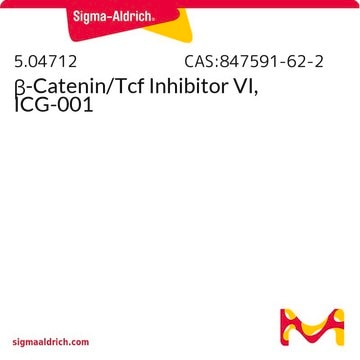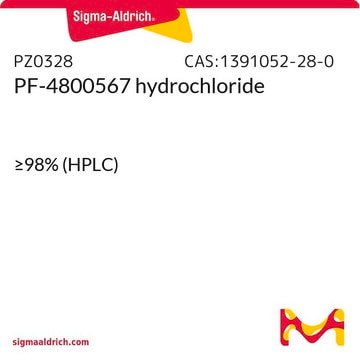Wichtige Dokumente
SML2464
KRN2
≥98% (HPLC)
Synonym(e):
KRN2, 13-[(2-Fluorophenyl)methyl]-5,6-dihydro-9,10-dimethoxy-benzo[g]-1,3-benzodioxolo[5,6-a]quinolizinium chloride
Größe auswählen
Größe auswählen
About This Item
Empfohlene Produkte
Assay
≥98% (HPLC)
Form
powder
Lagerbedingungen
desiccated
Farbe
faint yellow to dark orange
Löslichkeit
H2O: 2 mg/mL, clear (warmed)
Lagertemp.
2-8°C
SMILES String
FC(C=CC=C1)=C1CC2=C([N+](CC3)=CC4=C2C=CC(OC)=C4OC)C5=C3C=C(OCO6)C6=C5.[Cl-]
InChIKey
RPHFGOXVJGNJJH-UHFFFAOYSA-M
Biochem./physiol. Wirkung
Lagerklassenschlüssel
11 - Combustible Solids
WGK
WGK 3
Flammpunkt (°F)
Not applicable
Flammpunkt (°C)
Not applicable
Hier finden Sie alle aktuellen Versionen:
Analysenzertifikate (COA)
Die passende Version wird nicht angezeigt?
Wenn Sie eine bestimmte Version benötigen, können Sie anhand der Lot- oder Chargennummer nach einem spezifischen Zertifikat suchen.
Besitzen Sie dieses Produkt bereits?
In der Dokumentenbibliothek finden Sie die Dokumentation zu den Produkten, die Sie kürzlich erworben haben.
Aktive Filter
Unser Team von Wissenschaftlern verfügt über Erfahrung in allen Forschungsbereichen einschließlich Life Science, Materialwissenschaften, chemischer Synthese, Chromatographie, Analytik und vielen mehr..
Setzen Sie sich mit dem technischen Dienst in Verbindung.








